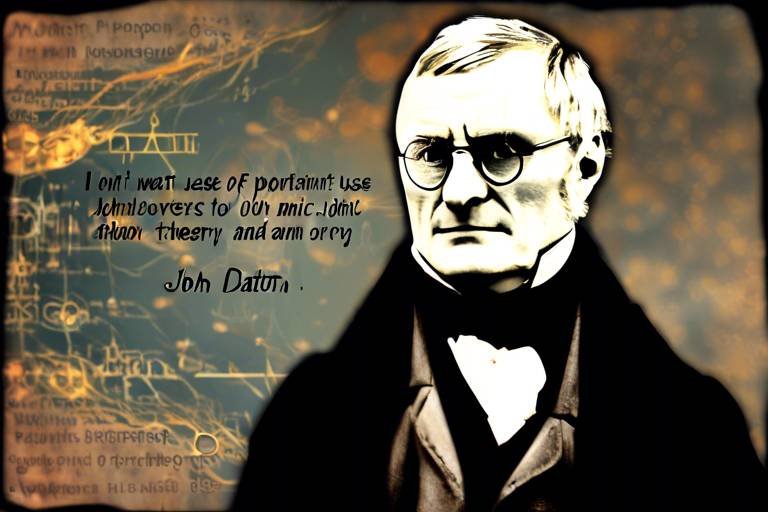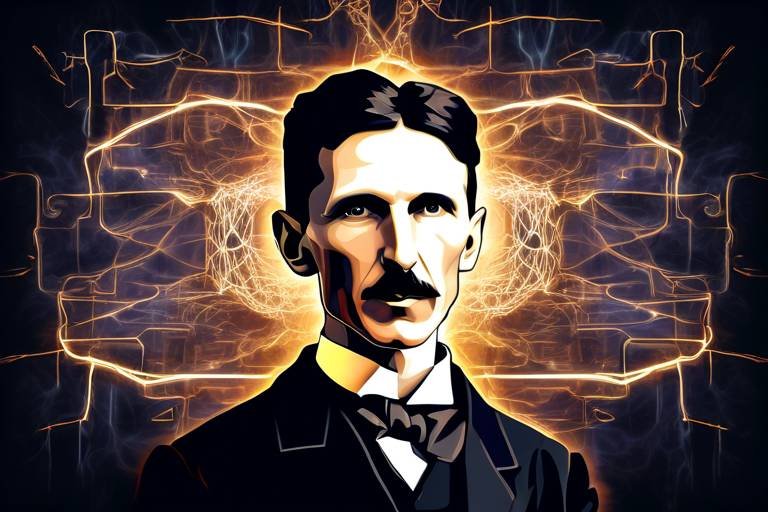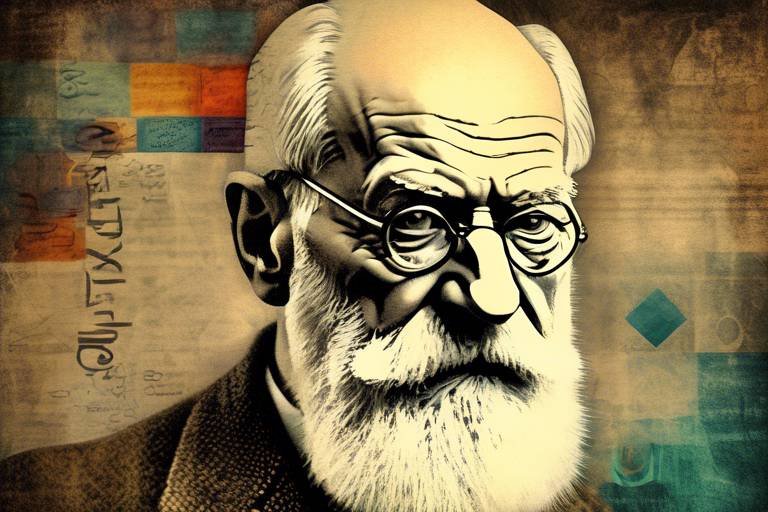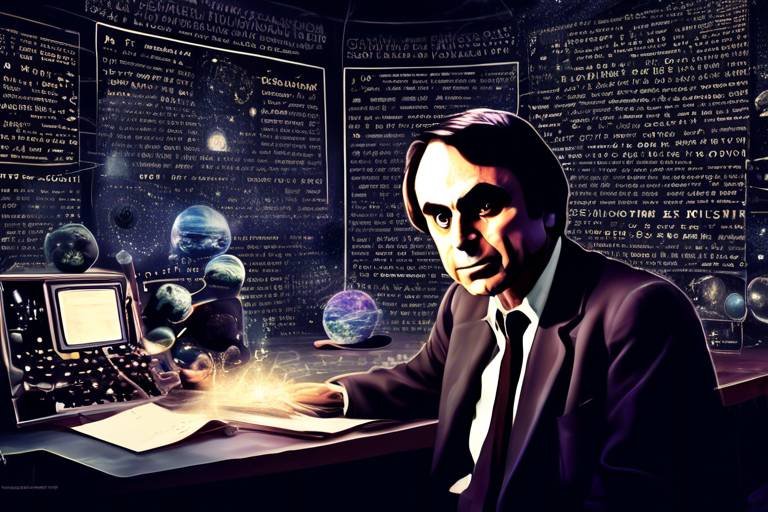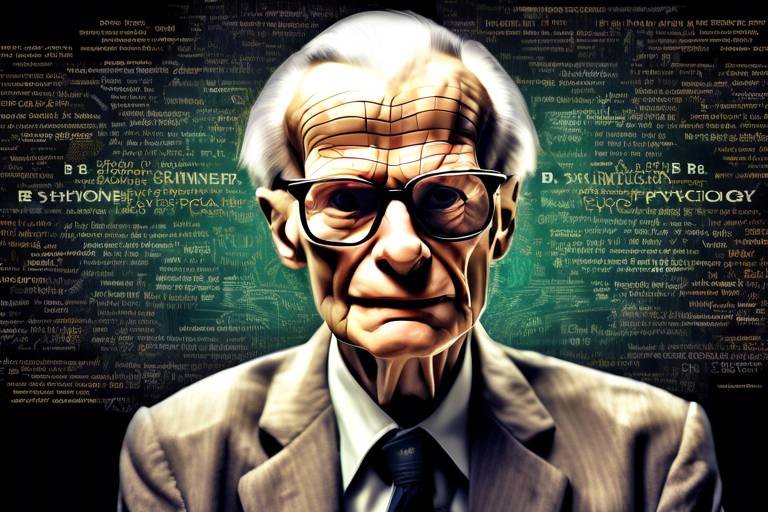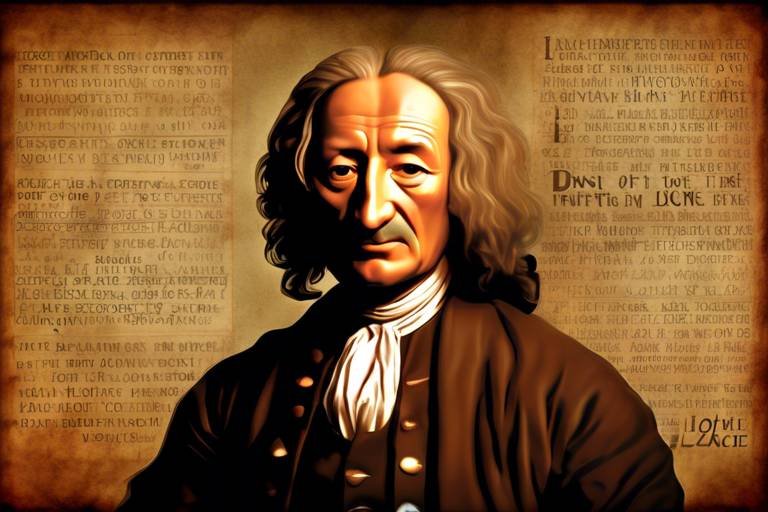The Theories of Karl Popper and Scientific Falsifiability
This article explores Karl Popper's contributions to the philosophy of science, particularly his concept of falsifiability, and its implications for scientific inquiry and theory development. Karl Popper, a name often echoed in the corridors of philosophical debate, revolutionized how we perceive the scientific method. His ideas were not just theoretical musings; they were a clarion call for a more rigorous approach to science, one that embraced doubt and skepticism as vital components of inquiry.
Imagine standing at the edge of a vast ocean of knowledge, where each wave represents a different scientific theory. Popper's theory of falsifiability acts as a lighthouse, guiding us through the murky waters of verification and validation. Instead of merely seeking confirmation of our beliefs, Popper urged scientists to actively seek out disconfirming evidence. This shift in perspective is akin to a detective searching for clues that might point to the suspect's guilt, rather than simply gathering evidence that supports an innocent verdict.
At its core, Popper's philosophy challenges us to reconsider what it means for a theory to be scientific. He posited that for a theory to be deemed scientific, it must be testable and refutable. This means that there should be a conceivable observation or experiment that could prove the theory wrong. For instance, consider the claim that "all swans are white." This statement is scientific because it can be tested; the discovery of a single black swan would falsify it. In contrast, a theory that is so vague that it cannot be tested—like "everything happens for a reason"—falls outside the realm of scientific inquiry.
Popper's emphasis on falsifiability not only distinguishes scientific theories from non-scientific ones but also enhances the dynamic nature of scientific progress. He believed that science advances through a process of conjecture and refutation. This is where the excitement lies! Each time a theory is tested and potentially disproven, it opens the door for new ideas and hypotheses to emerge. It’s like a game of chess, where each move can lead to a surprising twist in the game, keeping players on their toes and constantly adapting their strategies.
However, Popper's ideas have not gone unchallenged. Critics argue that the strict criterion of falsifiability can be too limiting. Some scientific theories, particularly in fields like cosmology and evolutionary biology, may not be easily testable with current methodologies. This raises an important question: Are there instances where a theory can still hold value even if it doesn’t meet the strict criteria of falsifiability? The ongoing debates surrounding these issues reveal the vibrant and ever-evolving nature of scientific philosophy.
In summary, Karl Popper's contributions to scientific philosophy, particularly his concept of falsifiability, have left an indelible mark on how we conduct scientific inquiry. His insistence on the importance of testing theories against potential disproof has fostered a culture of critical thinking and skepticism, essential elements for any robust scientific endeavor. As we navigate the complexities of modern science, Popper’s insights remain a guiding principle, encouraging us to embrace uncertainty and view challenges as opportunities for growth and discovery.
- What is Karl Popper's main contribution to philosophy?
Popper is best known for his concept of falsifiability, which states that for a theory to be scientific, it must be testable and refutable.
- How does falsifiability differ from verification?
While verification seeks to confirm a theory, falsifiability focuses on the potential to disprove it, highlighting a more dynamic approach to scientific inquiry.
- Are all scientific theories falsifiable?
Not necessarily. Some theories, especially in complex fields, may not be easily testable, which has led to debates about the strict application of Popper's criterion.

Introduction to Karl Popper
Karl Popper was a remarkable philosopher whose ideas have left an indelible mark on the philosophy of science. Born in 1902 in Austria, Popper's journey through academia was anything but ordinary. He challenged the established norms of scientific inquiry and introduced a fresh perspective that emphasized the importance of critical thinking. His work emerged during a time when traditional views dominated the scientific landscape, and he sought to break free from the confines of dogma and unchallengeable theories.
Popper's philosophy is often summarized by his famous assertion that "science is not about proving theories but about disproving them." This radical shift in thinking led to the development of his concept of falsifiability, which became a cornerstone of his epistemological framework. Rather than viewing scientific theories as absolute truths, Popper encouraged scientists to see them as hypotheses that must withstand rigorous testing. In his view, the hallmark of a scientific theory is its ability to be tested and potentially disproven.
His approach was revolutionary because it introduced a dynamic element to science. Instead of a linear path where theories are accumulated and verified, Popper suggested that scientific progress is more like a game of chess, where each move is scrutinized, and each theory is challenged. This perspective not only invigorated scientific discourse but also laid the groundwork for a more critical approach to knowledge. By advocating for such a methodology, Popper not only influenced scientists but also encouraged a broader cultural shift towards skepticism and inquiry.
In addition to his contributions to the philosophy of science, Popper also engaged with political philosophy, arguing for the importance of open societies and the role of critical rationalism in democracy. His ideas resonate beyond the realm of science, encouraging individuals to question, critique, and explore the world around them. This multifaceted approach to understanding knowledge and inquiry has made Popper a pivotal figure in both scientific and philosophical discussions.
In summary, Karl Popper's legacy is one of challenging the status quo and fostering a spirit of inquiry that continues to inspire scientists and thinkers today. His emphasis on falsifiability not only reshaped the scientific method but also encouraged a broader dialogue about the nature of knowledge itself. As we delve deeper into his theories, we will uncover the implications of his ideas and how they continue to influence scientific practices in our modern world.

The Concept of Falsifiability
Falsifiability, a term coined by the brilliant philosopher Karl Popper, is not just a fancy word thrown around in academic circles; it’s a fundamental principle that separates the wheat from the chaff in the realm of scientific inquiry. At its core, falsifiability posits that for a theory to be considered scientific, it must be testable and capable of being proven false. Imagine you’re a detective trying to solve a mystery. You wouldn’t just gather evidence that supports your theory; you’d actively look for clues that could disprove it. This is the essence of Popper’s philosophy—embracing the possibility of being wrong as a pathway to deeper understanding.
Popper’s approach was a radical departure from the prevailing notion of verificationism, which claimed that a theory is scientific if it can be confirmed through observation. Instead, he argued that the hallmark of a scientific theory lies in its ability to withstand rigorous testing. If a theory can be falsified, it means that it has made bold predictions that can be scrutinized, thus propelling scientific progress forward. Think of it this way: if a scientific theory were a ship sailing on the ocean of knowledge, falsifiability would be the compass guiding it away from dangerous waters of dogma and towards the shores of discovery.
To illustrate this concept further, let’s consider a few examples of theories that are falsifiable:
- Newton's Laws of Motion: If an object does not behave according to these laws under specific conditions, then the theory can be deemed false.
- Einstein's Theory of Relativity: Predictions made by this theory can be tested through experiments, such as observing the bending of light around massive objects.
- Darwin's Theory of Evolution: It can be challenged by presenting fossil evidence that contradicts the gradual change of species over time.
These examples showcase how falsifiability allows theories to be put to the test, creating a vibrant scientific dialogue where ideas can be challenged and refined. It’s not just about proving a theory right; it’s about creating a rigorous framework where theories can be questioned and improved upon. In this light, Popper’s idea of falsifiability serves as a beacon for scientists, encouraging them to develop hypotheses that are not only innovative but also grounded in the reality of empirical testing.
However, it’s important to note that not all scientific theories are easily falsifiable. Some, especially in fields like psychology or sociology, may involve complex variables that make definitive testing challenging. This raises an interesting question: if a theory cannot be easily falsified, does it lose its scientific credibility? Popper would argue that it does, but others might contend that such theories can still provide valuable insights. This ongoing debate highlights the dynamic nature of scientific inquiry and the necessity of continually refining our understanding of what constitutes a scientific theory.
In conclusion, the concept of falsifiability is crucial for distinguishing between scientific and non-scientific theories. It challenges us to think critically, to question our assumptions, and to embrace the uncertainty that comes with the pursuit of knowledge. Just as a sculptor chisels away at a block of marble to reveal a masterpiece, scientists must chip away at their theories, ready to reshape them in light of new evidence. This iterative process is what drives science forward, making it not just a collection of facts, but a living, breathing endeavor.

Falsifiability vs. Verification
When we dive into the world of science, one of the most intriguing debates revolves around the concepts of falsifiability and verification. Karl Popper, a towering figure in the philosophy of science, took a strong stance against the traditional verificationist view. Verificationism suggests that a theory is scientific if it can be confirmed or verified by observation and experimentation. In other words, if you can gather evidence that supports a theory, it’s considered valid. Sounds reasonable, right? However, Popper argued that this approach is fundamentally flawed. He believed that just because something can be verified, it doesn't necessarily mean it's true or scientific.
Think of it this way: Imagine you have a theory that all swans are white. If you see a hundred white swans, you might feel quite confident in your theory. However, the moment you encounter a black swan, your theory crumbles like a house of cards. This is where falsifiability shines. According to Popper, for a theory to be scientific, it must be testable and capable of being proven false. This means that rather than seeking to confirm our theories, scientists should actively look for evidence that could disprove them. The more a theory withstands attempts at falsification, the stronger it becomes.
To illustrate this further, let’s take a look at the differences between these two approaches:
| Aspect | Falsifiability | Verification |
|---|---|---|
| Definition | Ability to be proven false | Ability to be proven true |
| Focus | Disproving theories | Confirming theories |
| Scientific Validity | Requires rigorous testing | Can lead to confirmation bias |
This table highlights the core differences between falsifiability and verification. While verification can lead to a false sense of security, believing a theory is true just because it has been confirmed, falsifiability encourages a more dynamic and critical approach to scientific inquiry. It pushes scientists to embrace uncertainty and challenge existing theories, fostering an environment where knowledge is constantly evolving.
In summary, Popper's emphasis on falsifiability over verification not only reshaped our understanding of what constitutes a scientific theory but also laid the groundwork for a more robust scientific method. Instead of merely gathering evidence to support a theory, scientists are urged to engage in a continual process of testing and questioning. This approach is not just a philosophical stance; it’s a practical guideline that has profound implications for the advancement of science.
- What is the main idea behind falsifiability?
Falsifiability is the principle that for a theory to be considered scientific, it must be testable and able to be proven false. - How does falsifiability differ from verification?
While verification focuses on confirming theories, falsifiability emphasizes disproving them, which Popper believed was essential for scientific progress. - Can a theory be scientific if it is only verifiable?
No, according to Popper, a theory that can only be verified lacks the capacity for rigorous scientific testing and is therefore not scientific.

Examples of Falsifiable Theories
When we dive into the realm of falsifiable theories, we find a treasure trove of scientific ideas that have stood the test of time, not because they are immune to criticism, but because they invite it. One of the most celebrated examples is Albert Einstein's theory of relativity. This theory posits that the laws of physics are the same for all observers, regardless of their relative motion. It can be tested through various experiments, such as measuring the bending of light around massive objects. If future observations were to contradict this theory, it would be considered falsified, demonstrating the essence of Popper's philosophy.
Another classic example is Charles Darwin's theory of evolution by natural selection. This theory suggests that species evolve over time through a process of variation and selection. It can be tested through fossil records and genetic studies. If a significant number of fossils were found that contradicted the gradual changes proposed by Darwin, it would challenge the theory's validity. This openness to disproof is what makes it a prime candidate for Popper's falsifiability criterion.
In the realm of social sciences, theories of economic behavior also provide fascinating examples of falsifiability. For instance, the Efficient Market Hypothesis (EMH) claims that asset prices reflect all available information. If it were proven that investors consistently earned above-average returns exploiting available information, this theory would face substantial challenges. The ability to test and potentially disprove such theories underscores the dynamic nature of scientific inquiry.
To illustrate these examples further, let's take a look at the following table that summarizes key falsifiable theories and their implications:
| Theory | Proponent | Falsifiable Aspect |
|---|---|---|
| Theory of Relativity | Albert Einstein | Predictions about light bending around massive objects |
| Theory of Evolution | Charles Darwin | Gradual changes in fossil records |
| Efficient Market Hypothesis | Fama, Malkiel | Investors earning above-average returns |
These examples illustrate that falsifiable theories are not just abstract concepts; they are tangible frameworks that scientists can explore, test, and refine. They encapsulate the spirit of scientific inquiry, where questioning and testing lead to deeper understanding and progress. In a world where theories can be challenged and disproven, we find a vibrant landscape of knowledge that continues to evolve.

Challenges to Falsifiability
The concept of falsifiability, while revolutionary, has not been without its challenges and critiques. Critics argue that Popper's strict criterion may be too limiting for certain scientific theories that do not easily lend themselves to falsification. For instance, theories in fields like psychology or sociology often involve complex variables that are difficult to isolate and test. This raises the question: can a theory be considered scientific if it cannot be definitively proven false?
One of the most notable criticisms comes from the realm of scientific realism, which posits that scientific theories aim to describe the world as it is, rather than merely being tools for prediction or falsification. Proponents of this view argue that some theories, while not strictly falsifiable, still provide valuable insights and frameworks for understanding complex phenomena. For example, theories in quantum mechanics often defy straightforward falsification, yet they have led to profound technological advancements and deeper comprehension of the universe.
Moreover, some philosophers suggest that Popper's emphasis on falsifiability overlooks the importance of theoretical frameworks and the role of theories in guiding research. These frameworks can sometimes lead to the formulation of hypotheses that are not directly testable but still contribute to scientific knowledge. In this context, a theory's utility and explanatory power might be more significant than its falsifiability.
Additionally, the notion of falsification itself can be problematic. For example, when a theory is tested and a result contradicts it, scientists often modify the theory rather than discard it outright. This practice, known as theory adjustment, illustrates a more nuanced approach to scientific inquiry, where theories evolve in response to new evidence rather than being strictly accepted or rejected based on falsifiability alone.
In light of these challenges, it's essential to consider the broader landscape of scientific inquiry. While Popper's falsifiability remains a cornerstone of scientific philosophy, it is crucial to recognize that science is a dynamic process. It involves not only the testing of theories but also their refinement and contextualization within a larger framework of understanding. As the scientific community continues to evolve, so too does the discourse surrounding the validity and application of falsifiability in various fields.
- What is falsifiability? Falsifiability is the principle that a scientific theory must be testable and capable of being proven false.
- Why is falsifiability important? It distinguishes scientific theories from non-scientific ones, ensuring that theories can be rigorously tested and challenged.
- Are all scientific theories falsifiable? Not all scientific theories are easily falsifiable, especially in fields like psychology and sociology where variables are complex.
- What are some criticisms of Popper's falsifiability? Critics argue that it may be too limiting and that some valuable theories may not fit neatly into the falsifiability framework.
- How does falsifiability apply to modern science? While still relevant, the application of falsifiability in contemporary science is often more nuanced, involving theory modification and broader frameworks.

Popper's Impact on Scientific Methodology
Karl Popper's influence on scientific methodology is nothing short of revolutionary. Before his ideas took center stage, the scientific community often relied on methods that emphasized verification—essentially seeking evidence that supported existing theories. However, Popper flipped this notion on its head by advocating for a more dynamic approach. He argued that the hallmark of a scientific theory is not its ability to be proven true but its capacity to be falsified. This pivotal shift allowed scientists to engage in a more rigorous and critical examination of their hypotheses.
By promoting the idea that theories should be testable and open to disproof, Popper urged scientists to embrace uncertainty and skepticism. This led to a more robust scientific inquiry where hypotheses were not just accepted at face value but were subjected to rigorous testing. Imagine a scientist as a detective on a thrilling case; instead of collecting evidence to prove their theory, they are actively looking for clues that could potentially unravel it. This detective-like approach fosters a culture of critical thinking and encourages scientists to push the boundaries of knowledge.
Moreover, Popper's emphasis on falsifiability has had profound implications for how scientific research is conducted. It has encouraged the formulation of hypotheses that are not only ambitious but also specific enough to be tested. In practice, this means that scientists are constantly revising their theories based on new evidence, leading to a more iterative process of discovery. The scientific method, as we know it today, is heavily influenced by this ethos of continual questioning and testing.
To illustrate this impact, consider the following key aspects of Popper's influence on scientific methodology:
- Hypothesis Formulation: Scientists are encouraged to create hypotheses that are clear and precise, making them easier to test.
- Emphasis on Experimentation: The focus shifts towards designing experiments that can potentially disprove a theory rather than just confirm it.
- Dynamic Nature of Science: The understanding that science is not a linear path but a complex web of ideas that evolve over time.
In conclusion, Karl Popper's contributions to scientific methodology have fostered an environment where inquiry is driven by a quest for truth rather than mere confirmation. His ideas have not only enriched the scientific community but have also laid the groundwork for future philosophers and scientists to explore the complexities of knowledge and understanding. As we delve deeper into the realms of science, Popper's legacy continues to challenge us to think critically and remain open to the endless possibilities of discovery.
What is Karl Popper's main contribution to philosophy of science?
Karl Popper's main contribution is the concept of falsifiability, which asserts that for a theory to be scientific, it must be testable and potentially disprovable.
Why is falsifiability important?
Falsifiability is important because it distinguishes scientific theories from non-scientific ones. It encourages rigorous testing and critical scrutiny of hypotheses, thus driving scientific progress.
How did Popper's ideas change scientific inquiry?
Popper's ideas shifted the focus from verifying theories to actively seeking evidence that could refute them, fostering a more dynamic and iterative approach to scientific research.
Are there any critiques of Popper's falsifiability?
Yes, while widely recognized, Popper's falsifiability has faced critiques regarding its applicability and limitations, leading to alternative philosophies of science proposed by other thinkers.

Critiques of Popper's Falsifiability
While Karl Popper's concept of falsifiability has been a cornerstone in the philosophy of science, it has not gone without its share of critiques. Many philosophers and scientists argue that the strict adherence to falsifiability as a criterion for scientific theories may overlook the complexities and nuances inherent in scientific inquiry. For instance, some critics suggest that not all scientific theories can be easily falsified, especially those that deal with intricate systems or phenomena that are difficult to isolate and test. This raises the question: should we dismiss theories simply because they don't meet the stringent criteria of being falsifiable?
One major critique revolves around the notion that falsifiability is too limiting. Critics argue that many valuable scientific theories, particularly in fields like theoretical physics and astrophysics, do not lend themselves easily to empirical testing. For example, consider string theory, which proposes multiple dimensions beyond our observable universe. While it is a compelling theoretical framework, it currently lacks the empirical evidence needed to be considered falsifiable in the traditional sense. Does that mean we should disregard it as unscientific? Many would argue otherwise.
Another point of contention arises from the idea of scientific progress. Some philosophers, like Thomas Kuhn, argue that science does not progress through a linear accumulation of verified facts but rather through paradigm shifts that often challenge existing theories before they can be falsified. This perspective emphasizes the role of scientific revolutions and the sociocultural factors that influence scientific development, which Popper's framework seems to overlook. Kuhn's model suggests that scientific inquiry is more about consensus and less about stringent criteria for testing, leading to a more dynamic understanding of how science evolves.
Moreover, Imre Lakatos introduced the concept of research programs, arguing that scientific theories should be evaluated based on their ability to predict novel facts rather than solely on their falsifiability. According to Lakatos, a research program can still be considered scientific even if it has not yet been falsified, as long as it can generate hypotheses that lead to further discoveries. This perspective expands the discussion beyond mere falsifiability, allowing for a more comprehensive view of what constitutes scientific inquiry.
In addition to these philosophical critiques, practical challenges also arise in the application of falsifiability. In fields such as social sciences, where human behavior is influenced by numerous variables, establishing a clear, falsifiable hypothesis can be incredibly challenging. This complexity leads to the argument that the strict application of Popper's criterion may not be feasible or appropriate in all scientific domains. As a result, many scholars advocate for a more flexible approach to evaluating scientific theories, one that accommodates the diversity of scientific practices across various disciplines.
In summary, while Popper's falsifiability has undeniably shaped the landscape of scientific philosophy, it is essential to recognize its limitations and the alternative views that enrich our understanding of science. The critiques of Popper's framework highlight the need for a broader perspective on scientific inquiry, one that embraces complexity and acknowledges the evolving nature of scientific thought.
- What is falsifiability? Falsifiability is the principle that a scientific theory must be testable and able to be proven wrong.
- Why is falsifiability important? It helps distinguish scientific theories from non-scientific ones, promoting rigorous testing and critical thinking.
- What are some criticisms of Popper's falsifiability? Critics argue that it is too limiting and that many valuable scientific theories are not easily falsifiable.
- How do alternative philosophies of science differ from Popper's view? Philosophers like Kuhn and Lakatos propose that scientific progress involves paradigm shifts and research programs, rather than solely focusing on falsifiability.

Alternative Philosophies of Science
When we dive into the world of scientific philosophy, we quickly realize that Karl Popper's notion of falsifiability is just one piece of a much larger puzzle. Other philosophers have emerged with their own theories, challenging and expanding upon Popper's ideas. For instance, Thomas Kuhn introduced the concept of paradigm shifts, suggesting that science does not progress through a linear accumulation of knowledge, but rather through revolutionary changes in understanding. Kuhn argued that scientific communities operate under shared frameworks or paradigms, which dictate what is considered valid science at any given time. When anomalies arise that cannot be explained within the current paradigm, a shift occurs, leading to a new framework altogether.
On the other hand, Imre Lakatos offered a more nuanced take with his idea of research programs. According to Lakatos, scientific theories are not isolated entities but part of broader research programs that evolve over time. He proposed that a research program consists of a hard core of theoretical assumptions that are protected from falsification by a series of auxiliary hypotheses. This means that scientists can adapt their theories to accommodate new data, thus maintaining the integrity of the core ideas while allowing for flexibility in the face of challenges.
These alternative philosophies create a rich tapestry of thought in the realm of science. For instance, while Popper emphasized the importance of disproof, Kuhn and Lakatos provide frameworks that allow for the persistence of theories even in the face of contradictory evidence. This raises an intriguing question: is science more about the quest for truth or the evolution of ideas? Some argue that the dynamic nature of scientific inquiry, as highlighted by Kuhn and Lakatos, suggests that the pursuit of knowledge is not a straightforward path but rather a complex journey full of twists and turns.
Moreover, the implications of these philosophies extend beyond the confines of academia. They challenge how we perceive scientific authority and the role of consensus in the scientific community. For example, in today's world, where misinformation can spread rapidly, understanding these philosophical underpinnings can help us navigate the complexities of scientific discourse. It prompts us to ask critical questions about what we accept as scientific truth and how we validate our beliefs against the evolving landscape of knowledge.
In summary, while Popper's falsifiability remains a cornerstone of scientific philosophy, exploring alternative theories from thinkers like Kuhn and Lakatos enriches our understanding of how science operates. Each philosopher contributes a unique perspective, reminding us that the journey of scientific discovery is as important as the destination itself. As we continue to explore these ideas, we must remain open to the possibility that our understanding of science—and the universe at large—is always subject to change.
- What is falsifiability? Falsifiability is the principle that for a theory to be considered scientific, it must be testable and capable of being proven false.
- How does Kuhn's concept of paradigm shifts differ from Popper's falsifiability? Kuhn argues that science progresses through shifts in paradigms, while Popper emphasizes the importance of disproof as a criterion for scientific theories.
- What are research programs according to Lakatos? Research programs consist of a core set of theories that are protected from falsification by auxiliary hypotheses, allowing for flexibility in scientific inquiry.
- Why is understanding these philosophies important? They help us critically evaluate scientific claims and understand the nature of scientific knowledge as a dynamic and evolving process.

Falsifiability in Modern Science
In the ever-evolving landscape of modern science, the principle of falsifiability remains a cornerstone of scientific inquiry. It acts as a litmus test for theories, ensuring they are not just a collection of untestable assertions but rather robust hypotheses open to scrutiny. The relevance of falsifiability can be seen across various fields, from physics to social sciences, where researchers strive to formulate theories that can withstand rigorous testing and potential disproof.
Take, for instance, the realm of climate science. Theories regarding climate change are often framed in such a way that they can be tested against observable data. If a theory predicts a specific rise in global temperatures, it can be measured and, if proven wrong, discarded or revised. This dynamic process underscores how falsifiability fosters a culture of critical thinking and innovation in scientific research.
Moreover, in the field of medicine, the principle of falsifiability is essential for the development of effective treatments. Clinical trials are designed to test hypotheses about the efficacy of new drugs. If a drug does not produce the expected results, it is either modified or removed from consideration. This iterative process not only enhances our understanding of health but also ensures that only the most effective therapies reach patients.
However, the application of falsifiability is not without its challenges. In fields like psychology and sociology, where human behavior can be unpredictable, creating falsifiable theories can be complex. Researchers often grapple with the nuances of human experience, leading to debates about whether certain theories can indeed be tested. Despite these challenges, the commitment to falsifiability encourages scientists to refine their hypotheses continually and seek out better explanations for the phenomena they study.
To illustrate the impact of falsifiability in modern science, consider the following table that highlights key disciplines and examples of falsifiable theories:
| Discipline | Falsifiable Theory | Testing Method |
|---|---|---|
| Physics | The Theory of Relativity | Gravitational wave detection |
| Biology | Evolution by Natural Selection | Fossil record analysis |
| Medicine | Vaccine Efficacy | Controlled clinical trials |
| Psychology | Cognitive Behavioral Theory | Behavioral experiments |
This table not only highlights the diversity of fields that employ falsifiability but also showcases how it serves as a guiding principle for scientific progress. The ability to test and potentially disprove theories is what propels scientific knowledge forward, allowing for a continual re-evaluation of what we know.
In conclusion, falsifiability is not just a philosophical concept; it is a practical tool that shapes the fabric of modern scientific inquiry. By fostering a mindset that values critical examination and openness to disproof, scientists are better equipped to navigate the complexities of their respective fields. As we continue to push the boundaries of knowledge, the principle of falsifiability will remain a vital part of our scientific toolkit, ensuring that our understanding of the world is both rigorous and adaptable.
- What is falsifiability? Falsifiability is the principle that a theory must be testable and refutable, meaning it can be proven wrong through observation or experimentation.
- Why is falsifiability important in science? It helps distinguish scientific theories from non-scientific ones, promoting rigorous testing and critical thinking.
- Can all scientific theories be falsified? While many can, some theories in fields like psychology may be more challenging to test definitively due to the complexity of human behavior.
- What are some examples of falsifiable theories? Examples include the Theory of Relativity in physics and the theory of evolution in biology.
Frequently Asked Questions
- What is Karl Popper's main contribution to the philosophy of science?
Karl Popper is best known for his concept of falsifiability, which suggests that for a theory to be considered scientific, it must be testable and capable of being proven false. This idea shifted the focus from verifying theories to actively seeking evidence that could disprove them, fostering a more critical approach to scientific inquiry.
- How does falsifiability differ from verification?
Falsifiability and verification are two sides of the same coin. While verification attempts to prove a theory true by finding supporting evidence, falsifiability emphasizes that a theory should be open to disproof. Popper argued that science progresses through conjectures and refutations, making falsifiability a more robust criterion for scientific theories.
- Can you provide examples of falsifiable theories?
Sure! Classic examples include Einstein's theory of relativity, which can be tested through various experiments, and the theory of evolution, which can be challenged by fossil records or genetic evidence. These theories are designed in such a way that they can be disproven if new evidence arises, aligning perfectly with Popper's philosophy.
- What are some criticisms of Popper's concept of falsifiability?
Critics argue that not all scientific theories can be easily falsified, especially in fields like psychology or social sciences where variables are complex and interrelated. Furthermore, some philosophers suggest that the criterion of falsifiability might exclude valid theories that are difficult to test directly, leading to debates about its applicability in various scientific contexts.
- How has Popper influenced modern scientific methodology?
Popper's emphasis on testable hypotheses has encouraged scientists to adopt a more rigorous approach to research. His ideas have led to the development of methodologies that prioritize experimentation and critical testing, ultimately influencing how research is conducted across various scientific disciplines.
- What are some alternative philosophies of science to Popper's falsifiability?
Philosophers like Thomas Kuhn and Imre Lakatos have proposed alternatives to Popper's ideas. Kuhn introduced the concept of paradigm shifts, suggesting that scientific progress occurs through revolutionary changes rather than gradual falsification. Lakatos, on the other hand, proposed the idea of research programs that evolve over time, incorporating both successful and unsuccessful theories.
- Is falsifiability still relevant in contemporary science?
Absolutely! Falsifiability continues to play a crucial role in modern scientific discourse. It encourages researchers to develop theories that can be rigorously tested, ensuring that science remains a dynamic and self-correcting enterprise. In fields ranging from physics to biology, the principle of falsifiability helps maintain the integrity and progress of scientific inquiry.






